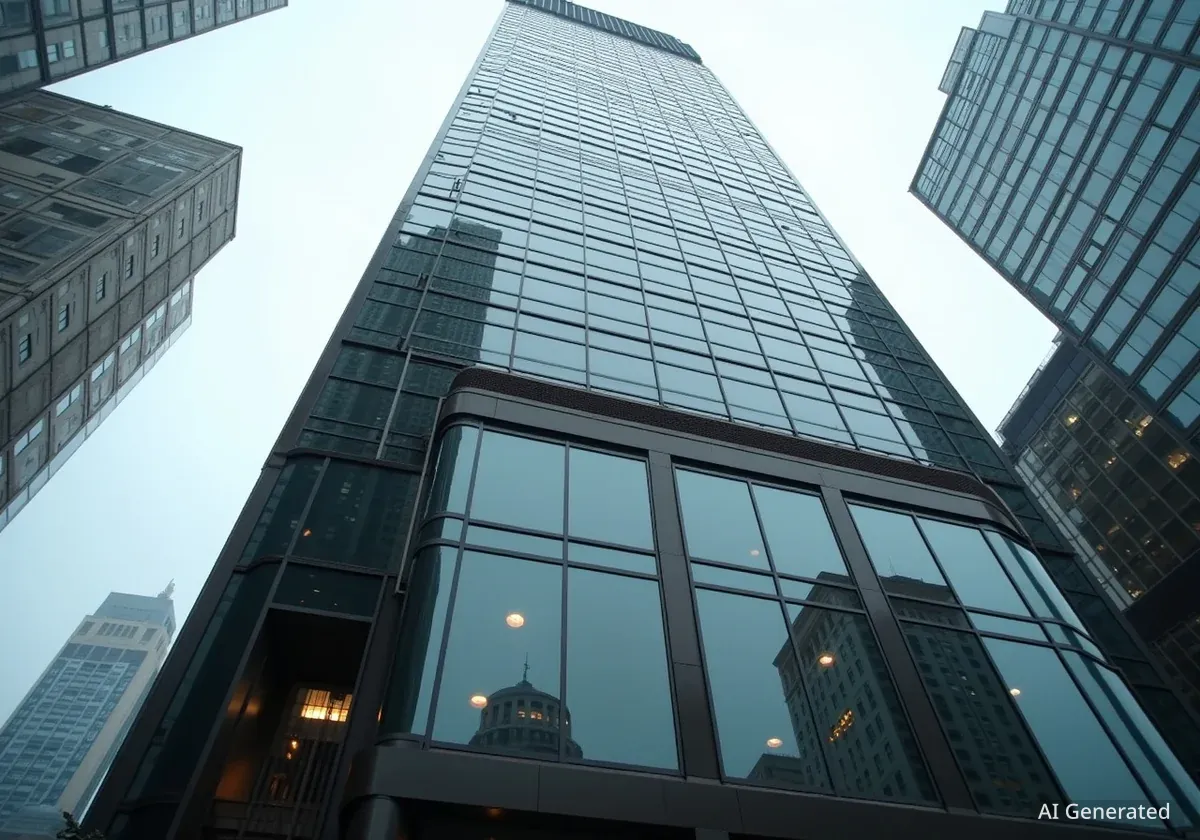With Zohran Mamdani emerging as the front-runner in New York City's mayoral race, the real estate and business communities are on high alert. His progressive platform, which includes rent controls and increased corporate taxes, has sparked concerns of a potential capital flight, but a look at other major U.S. cities with similar leadership suggests the reality of governing often tempers campaign promises.
While the prospect of a Democratic socialist mayor in the nation's financial hub is unsettling for many investors, the experiences of Chicago, Los Angeles, and Boston show that sweeping policy changes face significant hurdles, from legislative opposition to the practical complexities of urban economics.
Key Takeaways
- New York City's real estate industry is concerned about Zohran Mamdani's progressive agenda, fearing it could stifle investment.
- In Chicago, Mayor Brandon Johnson's key tax initiatives, like the "Bring Chicago Home" transfer tax, have been defeated by political and industry opposition.
- Los Angeles Mayor Karen Bass has streamlined affordable housing development but has been criticized for the economic impact of a "mansion tax" she did not propose but failed to block.
- Boston Mayor Michelle Wu has increased affordability requirements, but her rent control proposal has stalled at the state level.
- The gap between progressive campaign rhetoric and enacted policy in other cities suggests that dire predictions for New York's market may be premature.
The Challenge of Turning Promises into Policy
The rise of Zohran Mamdani in New York has created what some business leaders describe as an existential crisis. His platform, centered on housing affordability and corporate accountability, represents a significant departure from the pro-business policies of previous administrations. However, the path from a campaign platform to city law is rarely straightforward.
David Tarter, a former mayor of Falls Church, Virginia, who now directs a real estate program at George Mason University, noted that mayors cannot act unilaterally. "Regardless of their beliefs, mayors need community support and a legislative body to enact change," Tarter explained. This dynamic forces a level of compromise that often softens the most radical proposals.
This has been evident in several major cities where progressive leaders have taken office. While their elections generated similar alarm among business interests, their tenures have been marked by a mix of small victories, significant defeats, and pragmatic adjustments.
A Pattern of Resistance
In cities like Chicago and Boston, organized opposition from real estate trade associations and business chambers has proven effective in blocking or modifying tax and development policies. These groups often launch public campaigns and legal challenges that can delay or derail a mayor's agenda.
Chicago's Progressive Agenda Hits a Wall
When Brandon Johnson was elected mayor of Chicago in 2023, the city's real estate sector braced for impact. Johnson, backed by the Chicago Teachers Union, campaigned on a platform that included a corporate head tax and a significant increase in the real estate transfer tax for high-value properties.
However, his administration has struggled to implement these key initiatives. One of his highest-profile defeats was the "Bring Chicago Home" ballot measure, which aimed to more than triple the transfer tax on property sales over $1 million to fund services for the homeless. After a fierce campaign against it by groups like BOMA/Chicago, voters rejected the referendum in March 2024.
A Unanimous Rejection
Mayor Johnson's proposal for a $300 million property tax increase in late 2024 was met with a decisive and rare response from the City Council, which voted 50-0 against the measure. This highlighted the political resistance even a progressive mayor faces when trying to enact significant tax hikes.
Johnson's proposal to revive a corporate head tax, which would charge companies a monthly fee per employee, has also faced immediate opposition from city and state officials, including Illinois Governor JB Pritzker. Despite these setbacks, Johnson has found common ground with developers on one key issue: converting underused downtown office towers into apartments, a plan that includes subsidies for projects with a 30% affordable housing component.
Los Angeles: A Tale of Two Policies
In Los Angeles, Mayor Karen Bass took office with a "housing-first" agenda that many developers hoped would create new opportunities. Her efforts to streamline the notoriously slow permitting process have been widely praised. On her first day, she signed Executive Directive 1 (ED1) to fast-track 100% affordable housing projects.
The results have been significant. According to the Department of City Planning, ED1 has led to the approval of 29,000 affordable housing units—more than the combined total proposed from 2020 to 2022. This has reduced approval timelines from months to just weeks.
Despite this success, Bass's tenure has been complicated by Measure ULA, a voter-approved "mansion tax" on property sales over $5 million. While Bass did not propose the tax, her inability to block its implementation has been a point of contention. Real estate professionals argue the tax has chilled investment and slowed the market's recovery.
"While she has made strides in addressing needed affordable housing and development bottlenecks, her relationship with the [commercial real estate] community has been arduous," said Chris Cooper, a principal at Avison Young.
Sean Burton, CEO of developer Cityview, emphasized the mayor's role in shaping investor perception. "The mayor’s biggest job is to be a cheerleader and make businesses feel comfortable expanding in their city," he said, suggesting that policy wins must be paired with a pro-business narrative to restore confidence.
Boston's Balancing Act
Boston's Mayor Michelle Wu has also pursued an ambitious progressive agenda, creating the city's first new Planning Department in 70 years to prioritize community needs over deal-by-deal negotiations. She successfully raised the city's inclusionary zoning requirement, mandating that new residential buildings set aside 20% of units as affordable, up from 13%.
Wu also increased fees on large commercial projects to fund affordable housing and job training. However, her more transformative proposals have been blocked. A plan for rent control, which would cap annual rent increases, passed the City Council but remains stalled at the state legislature due to strong industry opposition.
Similarly, her effort to raise the commercial property tax cap to ease the burden on homeowners was rejected by the state. Critics argue these policies, combined with high construction costs, are making Boston less attractive for development. Yet, Wu's focus on converting downtown offices to residential use with steep tax incentives shows a pragmatic side to her housing strategy.
What This Means for New York
While the real estate industry's concerns about a Mamdani mayorship are palpable, the experiences in other cities provide a more nuanced picture. Mayors with progressive platforms often discover that their power is limited by city councils, state legislatures, and organized business interests.
Jonathan Miller, CEO of appraisal firm Miller Samuel, suggested the panic in New York might be overstated. "The doom and gloom is probably overhyped," he said, calling some of the reactions "fear mongering."
However, others remain deeply concerned. Greg Kraut, CEO of KPG Funds, argued that the issue with Mamdani goes beyond specific policies. "The biggest issue that everybody has is... he has said he hates capitalism," Kraut stated. "He wants a fundamental shift in what has built this country."
As New York City faces a potential political transformation, the lessons from Chicago, L.A., and Boston suggest that while a Mayor Mamdani could certainly shift priorities, the fundamental structure of the city's economy is unlikely to be upended overnight. The reality of governance will likely require compromise, leading to an outcome that is more moderate than either his supporters hope for or his detractors fear.





